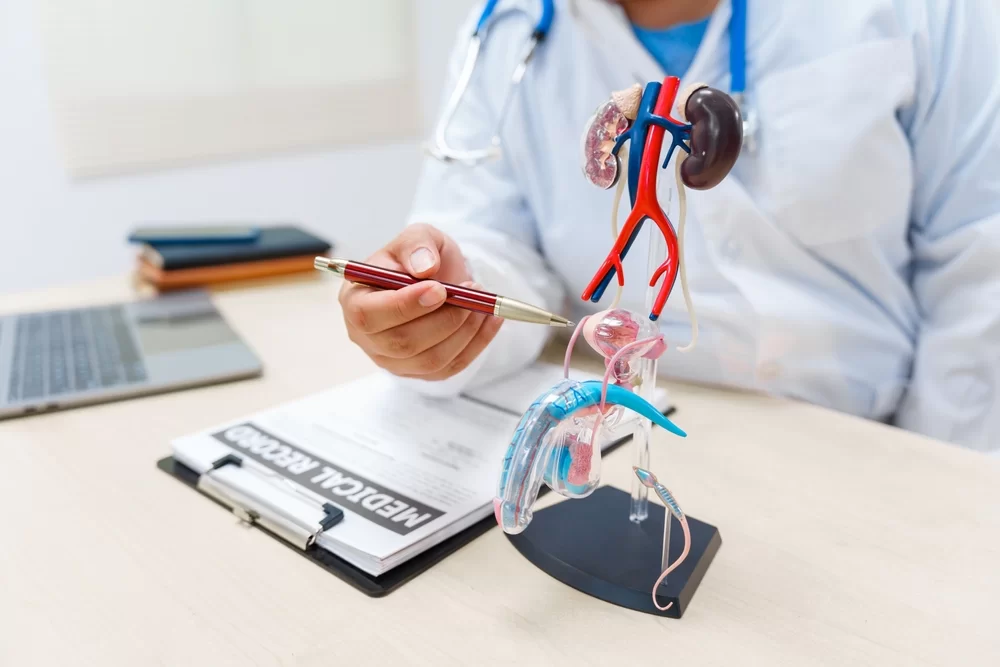Urology

Common Bladder Diseases
- Infectious Diseases: Medical treatments are applied following endoscopic examinations.
- Bladder Stones: Treated with intracorporeal lithotripsy and surgical procedures.
- Ureterovesical Junction Obstruction: Can be treated with endoscopic dilation and surgery.
- Vesicoureteral Reflux: Managed with endoscopic and surgical treatments.
- Bladder Tumors: Treated using intravesical drug applications and endoscopic methods.
Bladder and Prostate Diseases
- Urinary Incontinence in Women: Treated with endoscopic and open surgeries.
- Short Bladder Neck Syndrome: Managed with temporary bladder drainage and open surgery.
- Prostate Infection: Treated with medication.
- Benign Prostatic Hyperplasia (BPH): Managed with medication, endoscopic methods, or open surgery.
Urethral Diseases and Treatments
- Urethritis: Treated with medications.
- Urethral Stricture: Treated with dilation, endoscopic techniques, or open surgery.
- Urethral Stones: Removed using endoscopic methods.
Priapism and Related Disorders
- Balanitis and Phimosis: Managed with medication and circumcision.
- Erectile Dysfunction (Impotence): Diagnosed with papaverine test and Doppler ultrasound; treated with medications, surgery to improve blood flow, or penile prosthesis.
- Penile Curvature & Peyronie’s Disease: Treated with medication, injections, or surgery.
- Hypospadias and Fistula: Corrected with surgery.
Scrotal and Testicular Diseases
- Varicocele: Treated with medication, surgery, or microsurgery.
- Scrotal Infections, Trauma, and Tumors: Managed with medication and surgery.
- Male Infertility: Various treatment options are available.
- Hydrocele: Treated with fluid aspiration or surgery.
- Testicular Neoplasms: Managed with regular follow-ups and surgery.
Kidney Diseases and Treatments
- Kidney Abscess and Infections: Treated with medication and surgical drainage.
- Kidney Stones: Managed with medication, intracorporeal lithotripsy, endoscopic techniques, percutaneous nephrolithotripsy, or open surgery.
- Kidney Obstruction and Narrowing: Treated with endoscopic dilation, percutaneous nephrostomy drainage, or surgery.
- Kidney Cysts: Managed with percutaneous intervention or cyst removal surgery.
- Kidney Tumors: Treated with partial or radical nephrectomy.
- Kidney Trauma & Physical Injuries: Managed with medical care, repair surgeries, or kidney removal if necessary.
Ureteral Diseases and Treatments
- Ureteral Stones: Treated with medication, endoscopic stone removal, intracorporeal lithotripsy, or surgery.
- Ureteral Trauma and Tumors: Managed with various surgical and endoscopic techniques.
- Ureteral Strictures: Treated with endoscopic dilation, laser therapy, catheter placement, or surgery.
How to Receive Treatment?
By submitting your medical documents and complaints through our website's application form, your case will be evaluated by our affiliated doctors, and you will be informed about your treatment options as soon as possible.
Frequently Asked Questions
Urology is the medical field that focuses on diseases of the kidneys, bladder, urinary tract, and the male reproductive system. Common urological conditions include kidney stones, urinary tract infections, prostate diseases, bladder disorders, erectile dysfunction, and infertility.
Enlarged prostate or prostate cancer can cause symptoms such as difficulty urinating, frequent urination, waking up at night to urinate, burning sensation while urinating, and a weak urine stream. Men experiencing these symptoms should consult a urologist.
Kidney stones form when minerals in the urine crystallize. Small stones may pass on their own, while larger stones may require treatment such as medications, laser therapy (ESWL), endoscopic surgery, or open surgery. Drinking plenty of water and maintaining a healthy diet can help prevent kidney stones.